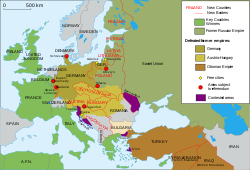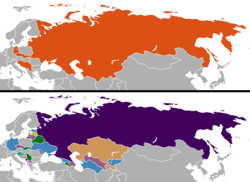The Term Balkanization Refers To

Balkanization is the fragmentation of a larger region or country into smaller regions or states, which may be hostile or uncooperative with one another. It is usually caused equally a geopolitical tool serving tertiary parties with the justification of differences of ethnicity, civilisation, and religion and some other factors such as by grievances. The term is debasing;[1] when sponsored or encouraged past a sovereign 3rd party, it has been used as an accusation against such third party nations. Controversially,[2] the term is often used by voices for the status quo to underscore the dangers of begrudging or runaway secessionism. Balkanization is a type of political fragmentation.
Nations and societies [edit]

Map of territorial changes in Europe afterwards World War I (as of 1923)

The term (coined in the early 19th century) refers to the division of the Balkan peninsula, which was ruled almost entirely by the Ottoman Empire, into a number of smaller states between 1817 and 1912.[three] It came into common use[2] in the firsthand aftermath of the First Earth War, with reference to the many new states that arose from the collapse of the Austro-Hungarian Empire and the Ottoman Empire.
Uses to stir opinion [edit]
Countries in Europe, where uniting quite recently historically singled-out peoples or nations, have seen outspoken separatists. These have prompted reactionary voices fearing Balkanization. The Iberian Peninsula, particularly Spain, has from the fourth dimension of Al-Andalus (catastrophe in 1492) seen voices fearing hell-raising rupture.[four] Its master separatist movements today are Basque separatism and Catalan independentism.[4]
Canada is a stable country but has separatist movements, the strongest of which is the Quebec sovereignty motility, which seeks to create a nation-country in Quebec, which encompasses the majority of Canada'south French-Canadian population. Two referendums take been held to determine the question, ane in 1980 and one in 1995. Both were lost by the separatists, the latter by a pocket-sized margin. Less mainstream and smaller movements also exist in the Canadian Prairie, especially Alberta, to protestation what is seen equally domination by Quebec and Ontario of Canadian politics. Saskatchewan Premier Roy Romanow as well considered separation from Canada if the 1995 referendum had succeeded, which would take led to the balkanization of Canada.
Quebec has been the scene of a small but vociferous partition movement from the part of Anglo-Quebeckers activist groups opposed to the idea of independence of Quebec since 80% of the province is francophone. One such projection is the Proposal for the Province of Montreal for the institution of a separate province from Quebec for Montreal's strongly-anglophone and allophone (speaking both English and French) communities.
In January 2007, the growing back up for Scottish independence made Chancellor of the Exchequer of the United Kingdom and later Prime Minister Gordon Brown talk of a "Balkanisation of Great britain".[five] Independence movements in the United Kingdom also be in England, Wales, Cornwall and Northern England (themselves parts of England) and Northern Ireland.
In Africa [edit]

Bates, Coatsworth & Williamson argued Balkanization was observed profoundly in West Africa then British East Africa. In the 1960s, countries in the Communauté Financière Africaine started to opt for "autonomy inside the French customs" in the postcolonial era. Countries in the CFA franc zone were immune to impose tariffs, regulate merchandise and manage transport services.
Zambia, Republic of zimbabwe, Republic of malaŵi, Republic of uganda and Tanzania achieved independence toward the stop of when the Peachy Powers postcolonial era came nigh. The period as well saw the breakdown of the Federation of the Rhodesias and Nyasaland as well equally the East African High Commission. Splintering into today's nations was a result of the move towards a closed economy. Countries were adopting antitrade and anti-market policies. Tariff rates were fifteen% higher than in OECD countries during the 1970s and 1980s.[6] Furthermore, countries took approaches to subsidise their own local industries, but the interior markets were small in calibration. Ship networks were fragmented; regulations on labor and capital menstruum were increased; price controls were introduced. Between 1960 and 1990, balkanization led to disastrous results. The Gdp of these regions were one tenth of OECD countries.[six] Balkanization likewise resulted in what van de Valle chosen "typically fairly overvalued exchanged rates" in Africa. Balkanization contributed to what Bates, Coatsworth & Williamson claimed to be a lost decade in Africa.
Economic stagnation ended only in the mid-1990s. Countries within the region started to input more stabilization policies. What was originally a loftier substitution rate somewhen fell to a more reasonable exchange charge per unit after devaluations in 1994. By 1994, the number of countries with an exchange rate l percent higher than the official exchange rate had decreased from 18 to four.[seven] However, there is still express progress in improving trade policies within the region, co-ordinate to van de Walle. In improver, the mail-contained countries nonetheless rely heavily on donors for development plans. Balkanization still has an impact on today's Africa. Nonetheless, this causation narrative is not pop in many circles.
In the Levant [edit]
During the 1980s, the Lebanese bookish and writer Georges Corm used the term balkanization to depict attempts by supporters of Israel to create buffer states based on ethnic backgrounds in the Levant in order to protect Israeli sovereignty.[8] In 2013 the French announcer Bernard Guetta writing in the Libération newspaper applied the term to:
- Lebanon's political sectionalisation between Muslims, Christians and Druze.[9]
- The Syrian Civil War.[9]
See likewise [edit]
- Dissolution of the Ottoman Empire
- Dissolution of Austria-Hungary
- Dissolution of the Soviet Matrimony
- Balkan Wars
- Balkan Federation
- Detachment (territory)
- Feudal fragmentation
- Kleinstaaterei
- Pillarisation
- Protracted social conflict
- Secession
- Self-determination
- Self-governance
- Sovereignty
- Treaty of Sèvres
- Treaty of Trianon
- Westphalian sovereignty
- Yes California
- Cuius regio, eius religio
References [edit]
Citations [edit]
- ^ Todorova 1994.
- ^ a b Simic 2013, p. 128.
- ^ Pringle 2016.
- ^ a b McLean, Renwick (29 September 2005). "Catalonia steps up to challenge Kingdom of spain". The New York Times. Archived from the original on 16 Oct 2017. Retrieved 15 Oct 2017.
- ^ "UK's Existence is at Take a chance – Brown". BBC News. 13 January 2007. Archived from the original on 15 Oct 2017. Retrieved 15 October 2017.
- ^ a b Bates, Coatsworth & Williamson 2007.
- ^ Van de Walle 2004.
- ^ Corm, Georges (January 1983). "La balkanisation du Proche-Orient" [The balkanization of the Center Eastward]. Le Monde diplomatique (in French). pp. two–3. Archived from the original on 22 February 2019.
- ^ a b Guetta, Bernard (28 May 2013). "La balkanisation du Proche-Orient" [The balkanization of the Heart E]. Libération.fr (in French). Archived from the original on 28 September 2019. Retrieved 28 September 2019.
Bibliography [edit]
- Bates, Robert H.; Coatsworth, John H.; Williamson, Jeffrey Yard. (2007). "Lost Decades: Postindependence Functioning in Latin America and Africa" (PDF). The Periodical of Economic History. 67 (4): 917–943. doi:10.1017/S0022050707000447. ISSN 1471-6372. S2CID 85549248.
- Pringle, Robert W. (2016). "Balkanization". Encyclopædia Britannica . Retrieved 15 Oct 2017.
- Simic, Predrag (2013). "Balkans and Balkanisation: Western Perceptions of the Balkans in the Carnegie Commission's Reports on the Balkan Wars from 1914 to 1996". Perceptions. 18 (2): 113–134. ISSN 1300-8641.
- Van de Walle, Nicolas (2004). "Economic Reform: Patterns and Constraints". In Gyimah-Boadi, E. (ed.). Autonomous Reform in Africa: The Quality of Progress. Boulder, Colorado: Lynne Rienner Publishers. pp. 29–63. ISBN978-i-58826-246-2.
- Vidanović, Ivan (2006). Rečnik socijalnog rada (in Serbian). Udruženje stručnih radnika socijalne zaštite Srbije; Društvo socijalnih radnika Srbije; Asocijacija centra za socijalni rad Srbije; Unija Studenata socijalnog rada. ISBN978-86-904183-4-3.
- Todorova, Maria (1994). "The Balkans: From Discovery to Invention". Slavic Review. 53 (ii): 453–482. doi:ten.2307/2501301. JSTOR 2501301.
External links [edit]
-
 The lexicon definition of Balkanization at Wiktionary
The lexicon definition of Balkanization at Wiktionary
The Term Balkanization Refers To,
Source: https://en.wikipedia.org/wiki/Balkanization
Posted by: stantonsittoss.blogspot.com


0 Response to "The Term Balkanization Refers To"
Post a Comment